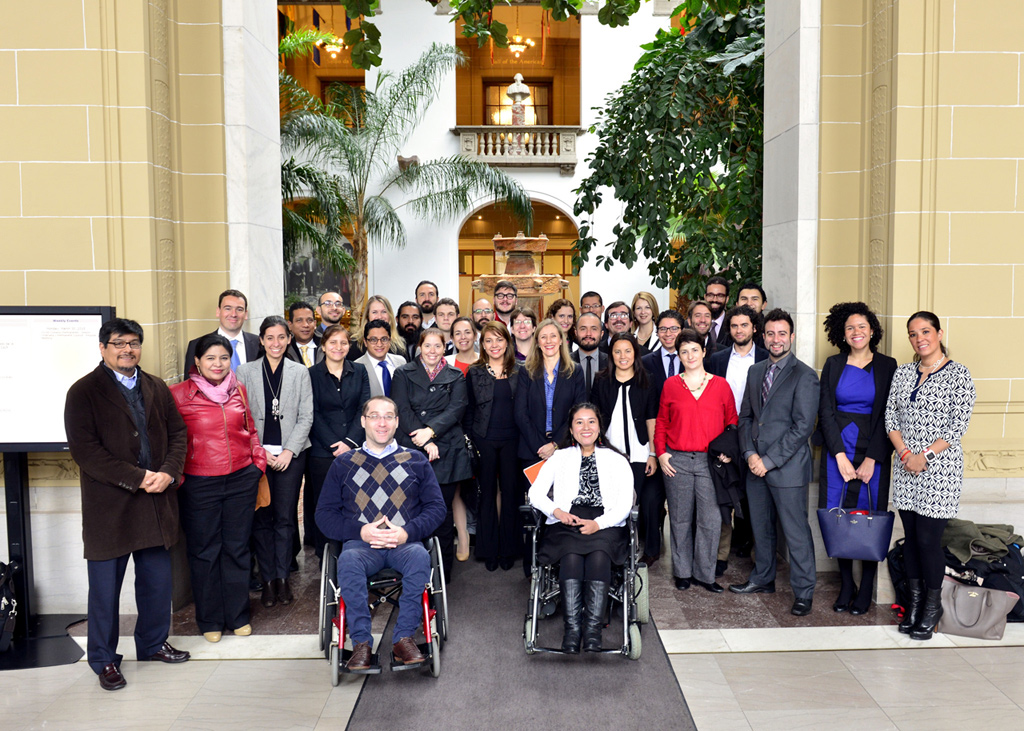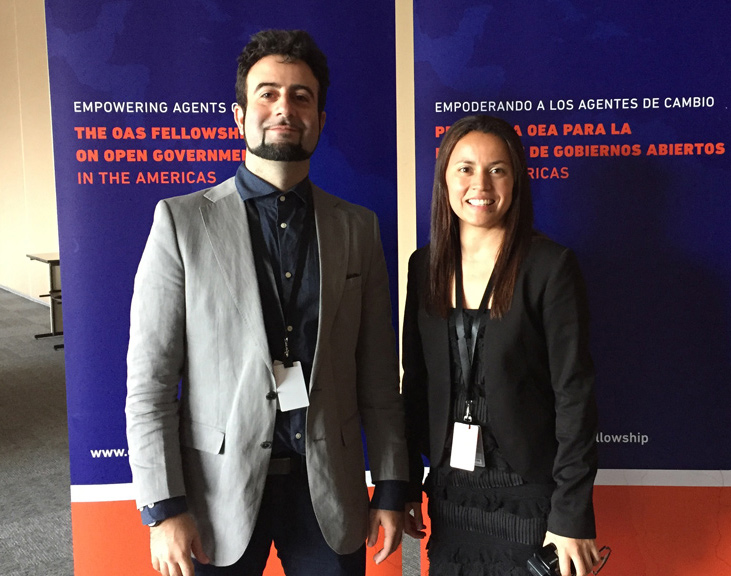- English
- Español
Media Center
Feature
Open Government: Building Together the Public Sector that we Want
October 28, 2015Citizen’s participation must be key in the creation and improvement of public services and in strengthening transparency and accountability.
Through its Fellowship on Open Government, the OAS creates spaces for young people to develop their own initiatives for the benefit of the Americas.
Can citizens be pro-active in making governments more transparent? Until recently, the response to this question still belonged to the utopian world. Today, thanks to Open Government, it has become a reality in many countries of the Americas.

Unlike the traditional and top-down approach, open government proposes a horizontal governance based on partnerships between government, citizens, civil society organizations, and the private sector.
“The promise of Open Government is not only to strengthen the democratic system that governs our nations, but also to foster a more active citizen participation in the policy debate and decision-making, a key element to consolidate and vitalize democracy.”
Luis Almagro
OAS Secretary General
This approach encourages direct and constant communication between governments and citizens as to the needs of the latter. The ultimate goal is to have a democracy by the citizens and for the citizens, one that defines public policies and management practices based on openness, accountability, and easy access to public information.
For OAS Secretary General Luis Almagro, it is evident that today “citizens are no longer satisfied with just receiving information, they also want to comment on and participate in the public policy process and decision-making, and this is where the concept of Open Government plays a key role,” he asserted. Ensuring this participation, he added, “is key to strengthening and enhancing democracy.”
Open Government has proven to be more than a trend. Its aim is to allow free access to information and citizen participation while promoting transparency, participation of and collaboration between all actors, as well as the use of information technology.
The OAS considers the issues of transparency, access to public information, and citizen participation as the cornerstone of a democratic government and, in that regard, it launched in 2014 the OAS Fellowship on Open Government in the Americas. The program opens each year to about 20 young people and includes online courses, a gathering of personal exchange with other participants in Washington, D.C., the promotion of team work with the support of expert tutors for cooperation at the regional level, and a final meeting for network strengthening and analysis of the replicability of initiatives.
The OAS Fellowshipis, to date, the only systematic effort aimed at working with the next generation of leaders in open government to provide them with the necessary tools to develop a professional and personal path conducive to the promotion of open-government practices in the region.
“The Fellowship concept arose in the summer of 2013, while we were exploring where and how the OAS could make an important contribution in that area without duplicating efforts already being made by other organizations and capitalizing on the role the OAS plays as regional forum,” explains Matthias Jaeger, Project Coordinator.
For the Fellowship’s first edition (2015), 24 participants from 16 different countries were selected. They took part in virtual and classroom courses and contributed to creating a space for reflection, discussion and knowledge sharing on issues related to Open Government, from a multidisciplinary and comprehensive approach. According to the participants in the initiative, their most valuable experience was the mutual learning shared between youth coming from different countries and sectors, the rich diversity, as well as the commitment they each demonstrated. This week, the participants in the Fellowship met again within the framework of the Open Government Partnership Global Summit that took place in Mexico City.
Media and Citizens to Achieve a Truly Open Government
Edilma Prada and Fabro Steibel were selected in 2015 for their project “Open Journalism”, which seeks to gather journalists and citizens for the preparation of reports on social issues and areas of interest for Colombian and Brazilian audiences. “With that project, we want to promote a culture of open government with a focus on journalism, to implement training programs in various areas such as traditional newsgathering techniques, to develop data search and visualization in order to help to stimulate participation and cooperation and to foster a true access to information,” says Edilma.
Edilma is a Colombian journalist who works in communities affected by the conflict in her country to provide information using open data on the relationship between the armed conflict, local powers, and the environment. Fabro, meanwhile, is a Brazilian expert in governmental and non-governmental platform development with open sources. Their mutual interest in promoting active participation through technologies brought them together under the OAS Fellowship to carry out this Open Journalism initiative.

Open Government, Equality, and Disability
Teófilo Urbieta was also one of the first participants. An activist for the rights of persons with disabilities in his native country, Paraguay, Teófilo works on a project for the inclusion of this usually marginalized group’s perspectives in the Open Government Partnership’s agenda and in national plans of action.
“The OAS Fellowship opened avenues for us to expand our vision of open government; exchanges between civil society, public officials and the private sector provide unparalleled wealth.”
Teófilo Urbieta, OAS Fellowship on Open Government’s participant
“The National Secretariat for the Human Rights of Persons with Disabilities was recently created in Paraguay, and we’ve seen that, in many instances, people with disabilities are no longer actively involved in the process of crafting public policies,” he explains. To that end, Teófilo proposed the creation of a Web platform adapted to the special needs of persons with disabilities and the organization of forums to discuss public policy design. His initiative is part of the activities carried out in the framework of “Parigual,” an organization of which he is president.
More information at http://www.oas.org/es/sap/dgpe/OpenGovFellowship/.
Reference: E-325/15


